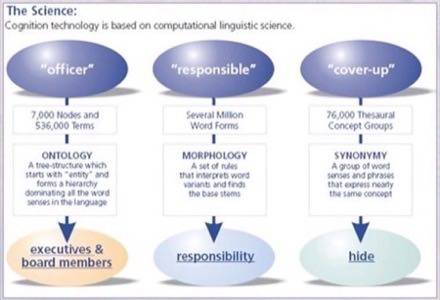Cognition Technologies, a Semantic Web company that specialises in Natural Language Processing (NLP) search, is today announcing the release of what it claims is “the largest commercially available Semantic Map of the English language.” We interviewed Cognition CEO Scott Janus to find out what this means.

We also discovered that Cognition, which currently licenses its technology to other organizations, is planning to build a general consumer search engine – which will compete with Google and others.
What is a Semantic Map?
A Semantic Map is kind of like a dictionary, in that it’s a representation of Cognition’s ability to define things. Cognition claims that its Semantic Map has over 10 million semantic connections; over 4 million semantic contexts (word meanings that create contexts for specific meanings of other related words); over 536,000 word senses (word and phrase meanings); 75,000 concept classes (or synonym classes of word meanings); 7,500 nodes in the technology’s ontology or classification scheme; and 506,000 word stems (roots of words) for the English language.

Image from Cognition
The company says that its Semantic Map “is more than double the size of any other computational linguistic dictionary for English”.
Cognition Technologies has been working on its technology for 24 years, with a lot of input from lexicographers and linguists over that time. Because they’ve used a mix of algorithms and human input, Cognition has been able to discern relevancy, meaning, synonymy. Scott Janus told us that one of Cognition’s strengths is that it can disambiguate words and phrases, which Janus says differentiates them from the keyword and pattern matching algorithms of Google, Yahoo and others.
For example Janus told us that Cognition’s technology can find results even if direct words are not used – which he says Google can’t do.
Cognition Plans General Search Engine
The comparisons to Google led us to ask the obvious question: does Cognition’s semantic technology have a more general application? In other words, does Cogition plan to take on Google by creating a search engine for consumers? CEO Scott Janus replied that yes they do plan to “one day offer search on the general web”. However he said that they need more capital funding to index the entire Web, put infrastructure in place, etc.
As of now Cognition will continue to license its semantic technology to verticals like law and health. Janus told us that Cognition is “good for complex content where lot of synonyms are used”, so right now data-intensive industries are where it is aiming.
Cognition’s current applications include legal (e.g. LexisNexis Concordance’s case management), health (e.g. MEDLINE), and a semantically charged version of Wikipedia.
Image from Cognition

Cognition vs Powerset and Hakia
Two other Semantic search engines we’ve been tracking closely on ReadWriteWeb are Powerset and Hakia. We asked CEO Scott Janus what makes Cognition different from those two products?
In a nutshell, Janus says that its Semantic Map is bigger and better.
Specifically, he said that Powerset is actually “not so similar” to Cognition. According to Janus, Powerset does “parsing” – which it licensed from Xerox Parc. That is 20-25% of the solution, said Janus, but Powerset “doesn’t have a good semantic map”. Cognition went so far as to write a white paper (pdf) explaining why it thinks Powerset “misses the point”.
As for Hakia, Janus said that as far as he can see Hakia is focused on “ontological classifications” – classifying words and concepts together. But he says Hakis doesn’t have as full a semantic map as Cognition, so he thinks Cognition has “a better understanding” compared to Hakia.
In summary, Janus told us that semantic search companies “must include a comprehensive semantic map” to be successful. We’re sure that Powerset and Hakia will have different opinions on what makes a successful semantic search company, but it does make for a good differentiator for Cognition.
Open Question
Tell us in the comments what you think of Cognition and whether you think it can compete with Google in the long run?

















